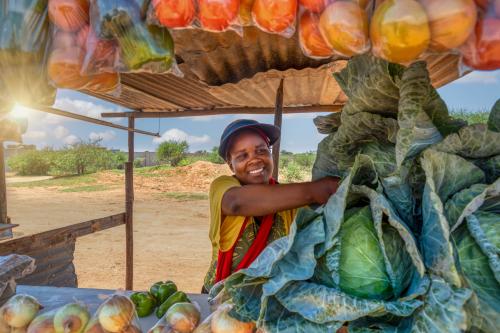Earlier this year in June, after much deliberation by the South African Competition and Competitiveness Tribunal, Wal-Mart purchased a 51 percent share in the South African retailer Massmart. Under the agreed upon conditions, the merged entity would do the following: refrain from cutting any current Massmart jobs for two years, give hiring preferences to the 503 employees that were retrenched by Massmart in June 2010, honor labor bargaining rights for at least three years, and implement a local suppliers’ development program worth R100 million within three years of the merger to improve the competitiveness of South African producers. Wal-Mart estimates that the merger will create up to 15,000 jobs in the next three years and increase local procurement by R60 billion.
The opposition coalition, which is composed of two organized labor unions — The Congress of South African Trade Unions and The South African Commercial, Catering and Allied Workers Union — and three government departments — Economic Development, Trade and Industry, and Agriculture, Forestry and Fisheries — is not satisfied with the terms of the merger due to concerns about job loss. The opposition coalition has recently brought their argument to the Competition Appeals Court in Cape Town. The key demand from the coalition is that Wal-Mart scale up the local suppliers’ development program from R100 million to R500 million. This is an attempt to hedge the Wal-Mart merger from shifting retail procurement to more imported goods, and potentially worsening an already gloomy unemployment situation by destroying jobs in agricultural production and manufacturing.
According to the opposition, an estimated 4,000 jobs will be lost from consumer goods, food and beverage sectors if just one percent of procurement shifts from local to imported merchandise. The government ministries point to Wal-Mart’s propensity to import from Chinese suppliers as a pitfall of the merger for South African producers. A report on the South African labor market by the Development Policy Research Unit (DPRU) at the University of Cape Town shows that agricultural and manufacturing sectors are already in decline; between the second quarter of 2009 and the same period in 2010, employment in the agriculture, forestry and fishing sector contracted by 13 percent; while the manufacturing sector contracted by 11 percent.
The sheer size of Wal-Mart in the United States gives the opposition coalition cause to be wary that the firm will change the supplier relationships of incumbent retailers if they struggle to compete with the low-price giant. As of August 2011, Wal-Mart reported that it had approximately 1.4 million employees in the United States and 700,000 employees worldwide. As of 2008, Wal-mart made up 10 percent of the U.S. Retail Sector, one percent of U.S. employment, and was the largest grocer and third largest pharmacy in the United States. However, Wal-Mart does not have the same clout in international markets as it does in the United States. In Germany, Wal-Mart entered as a smaller share of the retail market in comparison to the domestic competition. Wal-Mart was eventually pushed out of Germany by the well established retailer, Aldi, principally, because Aldi had already offered German consumers low prices and developed streamlined relationships with suppliers. In Mexico, local retailers Gigante, Comercial Mexicana and Soriana created a purchasing association, called Sinergia, to compete with Wal-Mart’s purchasing prowess. The incumbent retailers in South Africa also have well-developed relationships with suppliers, and Massmart does not have the largest market share. Massmart South Africa has only 316 stores, compared with Shoprite’s 1,800 stores and Pick n Pay’s 775. Additionally, Shoprite and Pick n Pay are aggressively expanding to other parts of Africa in search of the growing African middle class. The examples from Germany and Mexico show that incumbent retailers can maintain their share of the market and their existing relationships with suppliers upon Wal-Mart’s entry.
The labor union contingent of the coalition is also worried about maintaining job quality with Wal-Mart as an employer. Although the company has earned a reputation as an anti-union, low-wage and low-benefit employer in the United States, the retail giant has not earned this reputation internationally. Wal-Mart pays workers in Mexico higher bi-weekly salaries than the major supermarket chains; the same holds true in China and Germany. Although Wal-Mart’s tendency has been to maintain an anti-union posture in the United States and other wealthy nations like Canada, it has accommodated organized unions’ demands in poorer countries. It is not likely that the deleterious labor rights effects purported by the South African unions will materialize. This is especially true if Wal-Mart intends to use South Africa as its port of entry into the African retail market, as the company would not want to ruin its chances on the continent.
The resistance to Wal-Mart in South Africa stems from the extraordinarily high level of unemployment the country faces. As the agricultural and manufacturing sectors are already contracting under the weight of global competition, it will be difficult to isolate Wal-Mart’s effect on job numbers in those specific markets, although the supplier development program may help in averting future job losses. The conditions already attached to the merger should offset job destruction from any increase in imports from outside of South Africa, at least for the two years that Wal-Mart is under the retrenchment ban. The reaction to the Wal-mart-Massmart merger highlights the reluctance of the South African government to allow any foreign investment that might destroy jobs. While Massmart and Wal-Mart may resent an increase in the level of obligations currently being considered by the Appeals Court in Cape Town, they may have to consider them as the fixed cost of initiating operations in Africa.
The Brookings Institution is committed to quality, independence, and impact.
We are supported by a diverse array of funders. In line with our values and policies, each Brookings publication represents the sole views of its author(s).


Commentary
Op-edBig Box vs. Spring Boks: Wal-Mart’s Troubles Entering the South African Retail Market
November 1, 2011